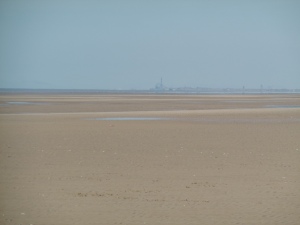Short of stature, slightly flushed of face – it’s cold outside and warm in – he’s wearing a navy blue waterproof with his employer’s name on it. His accent is straight Scouse, the real Liverpool kind, not the phlegmy exaggeration some affect.
He wipes his feet and pads through to the garage, where the meters lurk.
Shines his torch on the electric one across the piles of junk and stands up close to the gas.
How did the conversation start?
The weather, of course. Talking of Sunday.
‘What were you doing in Yorkshire?’ he asks.
It’s like a clockwork figure has been wound up.
‘You’ll never believe this, me nanna lived a mile outside Haworth.’
Born in the 19th century his nan moved to Haworth for work – in the mills. She lost the fingers on one hand, cut off in an industrial accident. We agree that health and safety is unfairly maligned. Just think how many fingers it’s saved.
Lizzie-Anne, the nan, used to sit on the stone the Brontë girls sat on, she said.
Her grandson is one of those ‘don’t judge the book by the cover’ people.

A superficial glance would have him down as a tough character – and he probably is – but while he looks like a football referee or a shop steward, a picture on the wall has him choked up.
When he passed his driving test inthe 1970s, one of the first things he did was to take his nan and his girlfriend on a trip – to Haworth.
It was a moving experience. And not just for his nanna. The house has an atmosphere, he agrees, that’s moving enough for tears. In it you can’t help but feel the tragedy of the Brontës’ lives.
HIs nan talked about that trip for the rest of her life. Her best trip ever.
The conversation moves on to Emile Zola, his favourite author. ‘Better than Tressell,’ he says – and then has to add, ‘you know, The Ragged Trousered Philanthropists’ to enlighten the owner of the blank stare facing him.
‘That’s just about socialism,’ he says, ‘now, Zola,’ and shakes his head, too filled with admiration to know where to begin. Though he does. Pausing briefly on Germinal and La Bête Humaine before settling on L’Assommoir as the best of the lot.
‘I reckon George Orwell used some stuff from Zola in Down and out in Paris and London,’ he says with a grin.
The talk turns to his nan’s advice to him not to take up the boxing beloved of part of his family – or the rugby league she encountered in Yorkshire.
‘I’ve seen men with their ears all bloody, bitten off,’ she told him – and it worked. He’s not boxed, nor chucked the pointy ball. It’s football, for him – well, he is from Everton.
His eyes turn back to the painting on the wall, of the bascule bridge on Liverpool’s dock road. He shakes his head, emotions stirred. This man loves the bleakness – landscapes and industrial remnants alike.
Ranging now through the Lake District, to Lowry, he leaves determined to look up Lowry’s landscapes and seascapes, after issuing instructions to look up a painting of a Lake District slate miner’s hut.*
A shake of the hand, a shake of the head – and a day that’s taken a turn for the better, for two very different people. When would they ever have met, otherwise?
That English penchant for talking about the weather – you never know what hares it will set running.
What a day. (And yes, it’s raining.)
* he can’t remember the artist’s name – and searches are proving futile






